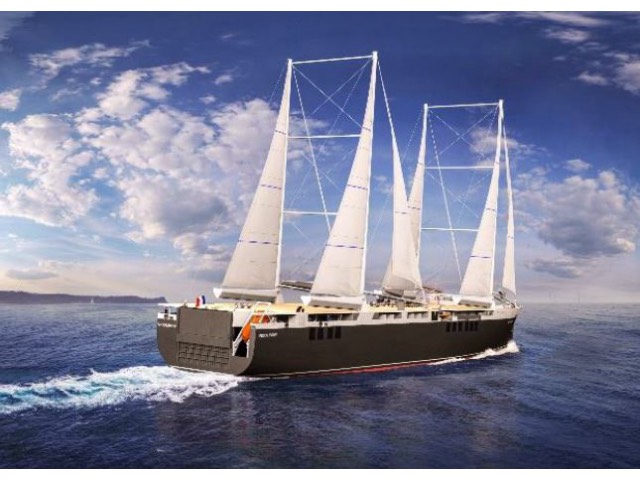In December 2019, EDF and Neoline signed a specific agreement for the issue of Energy Saving Certificates (ESC) which confirms and enhances the high environmental performance of the owner’s future commercial sailing vessels.
Based on the Neoliner, a 136-meter long pilot vessel with 4200 square meters of sail, EDF has conducted studies with its R&D to quantify the energy savings that can be achieved: the Neoline mainsail propulsion vessel model will save 600,000 MWh cumac over 15 years, which is equivalent to the production of three 6 MW wind turbines for 10 years or the energy consumption of a city of 9,000 inhabitants for 10 years.
By combining a regulated speed and optimised management of the energy mix with the main wind propulsion system, Neoline’s solution will reduce energy consumption by up to 90 per cent, and therefore the associated pollutant emissions, compared with those of a traditional cargo ship on the same route.
“We are very pleased to have been able to confirm the exceptional energy performance of our future vessels, in close collaboration with EDF teams, and to see our business model strengthened by this agreement. We welcome EDF’s investment in the energy transition of maritime transport. I would also like to thank Armateurs de France, which was at the origin of our contact with EDF,” said Jean Zanuttini, managing director of Neoline.
The ship combines in an innovative way technologies from maritime transport, but also from sport sailing, in order to allow an efficient transport in terms of logistics, economy and environment. With a reasoned commercial speed of 11 knots, advanced meteorological routing systems and trained and involved crews, it is also able to test a set of complementary technologies to move towards Zero Emission in the medium term, thus meeting regulatory and societal requirements to accelerate the energy transition in the maritime shipping.
With the support of players such as Renault Group, Manitou Group and Groupe Beneteau, who have demonstrated the logistical and economic relevance of the new service for the region’s industrials, Neoline plans to place an order for the construction of the first vessel with SAS NEOPOLIA MOBILITY in the near future, with a view to commissioning the pilot line between St-Nazaire, St-Pierre & Miquelon, Baltimore and Halifax in 2022.
Michel MAGNAN, EDF Pays de la Loire regional delegate, said: “Applied to the field of maritime transport, the use of wind energy is an innovative solution to contribute to the energy transition. EDF is proud to support Neoline in the development of a promising solution to improve the energy performance of its vessels.”
This operation is very innovative and is part of the French Energy Saving Certificates scheme, which is based on an energy saving obligation imposed by public authorities on energy suppliers. It is specific between EDF and Neoline and applies for the first time in the maritime transport sector.
Source: VPO Global









































